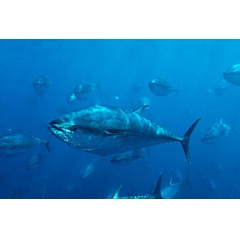Too many boats chasing too few fish imperil tuna populations in the Eastern Pacific
WWF has called for leaders of member states attending the 94th meeting of the Inter-American Tropical Tuna Commission (IATTC), July 22 – 26, to take specific, urgent measures to reduce the pressure on imperilled tuna populations.
WWF will highlight the plight of tuna species including Pacific bluefin which has been subjected to such heavy fishing that its spawning stock biomass has plunged to 3.3 per cent of the unfished level according to the most recent stock assessment. There are also serious concerns for populations of yellowfin and bigeye tuna.
WWF’s head of delegation at the IATTC meeting, Pablo Guerrero, said, “It is vital for the health of the Pacific, and the wellbeing of countless fishing communities, that member states make genuine, steadfast commitments at this meeting to rein in rampant overfishing.”
WWF has outlined specific decision points the meeting must deliver on, for stakeholders to have any confidence that tuna populations and impacted ecosystems will recover and is drawing particular attention to overcapacity.
Mr Guerrero said, “When year after year, Pacific bluefin tuna continues to be fished almost to collapse, and with yellowfin and bigeye tunas also in trouble, we know something is fundamentally wrong. Member countries are failing to heed the warnings despite fleet capacity being double the IATTC’s own target.”
“Unless strong action is taken, the only option left is to cut the fishing season further, or ultimately to close the commercial fishery for a time so the populations can recover, while more effective management oversight is put in place.”
WWF is also pointing to the proliferation of fish aggregating devices (FADs) which add to overfishing but are not monitored or managed, and are entangling and drowning ocean wildlife.
Mr Guerrero said, “It is clearly unacceptable for the IATTC not to know how many FADs are in use, where they are or what their cumulative impacts are on tunas, sharks, turtles and other species. The IATTC is flying blind on this issue.”
“This meeting must resolve clearly to require all member states to immediately report publicly on the use of FADs and to support preliminary scientific advice which likely will require a significant reduction in their deployment.”
WWF will also call for policy recommendations on key issues including: for member states to ensure that their fleets and fisheries are free from slavery, and from forced and poor labour conditions, and that they have clear and effective measures to eliminate these practices; boosting observer coverage on long-line vessels from the current unacceptably low level of 5 per cent, to 20 per cent immediately, and 100 per cent (human and electronic) in the near future; rapidly improving data collection on the capture of sharks to trigger overdue management interventions; ensuring overall compliance is fully transparent; cooperating with the Western and Central Pacific Fisheries Commission to urgently address the depleted population of Pacific bluefin tuna and other species that fall under joint responsibility; and, for all remaining members of the IATTC to ratify the port-state measures agreement.
-----
-
IATTC member and cooperating non-member countries meet in Bilbao, Spain from 22-26 July, 2019. WWF’s complete position statement for the 94th Meeting of the IATTC is available here.
-
Experts have provided options for addressing fishing capacity.
-
Fish aggregating devices (FADs): Fishes, like tuna, gather beneath these floating objects, and technology makes it possible for vessel captains to find and monitor them from a distance, enabling them to pursue the biggest schools and save resources, reducing uncertainty. However, FADs can entangle and drown other marine wildlife as well, and technological improvement and reform in their use is vital. When set adrift they can also add to plastic pollution of the oceans
( Press Release Image: https://photos.webwire.com/prmedia/6/244110/244110-1.jpg )
WebWireID244110
This news content was configured by WebWire editorial staff. Linking is permitted.
News Release Distribution and Press Release Distribution Services Provided by WebWire.
